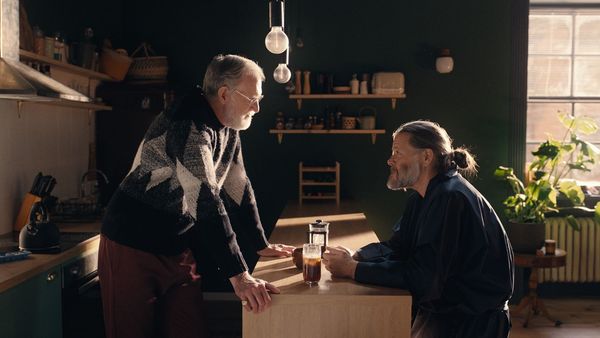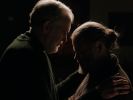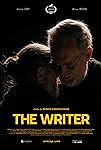Eye For Film >> Movies >> The Writer (2023) Film Review
The Writer
Reviewed by: Amber Wilkinson

There's a gentle soulfulness underlying Romas Zabarauskas' tale of reconnection between two old lovers that runs the constant risk of being buried by a film that is also being used as a vehicle to consider densely scripted philosophical and political viewpoints. Co-written by Marc David Jacobs, Anastasia Sosunova and Arturas Tereskinas there's enough topics of conversation here to fill the same amount of movies and some paring back would have been welcome.
The chamber piece - enlivened by some nice New York street interludes and a jazzy score from Ieva Marija Baranauskaite - unfolds largely in the apartment owned by Lithuanian writer Kostas (Bruce Ross). He is about to share a meal with former lover Dima (Jamie Day) - a Russian emigre to Lithuania - along with a ruminative conversation which will cover everything from the conflict in Ukraine to assumptions made about bisexuals.

Tension springs from the circumstances in which the pair split up and in Kostas' use of his life experience as material for his books - a topic that feels somewhat in vogue this year after Anatomy Of A Fall. While the discussion of this feels natural, the men's slip into more political back and forth feels much less so. Kostas represents a sort of intellectual viewpoint while Dima could be said to come more at things from the heart but there's an unavoidable theatricality in the way the conversation shifts from one hot button issue to the next. The denseness of the script also makes it tricky for the actors, with Ross proving more successful than Day at selling his character's position. Of course, serious topics will come up in conversation but to have quite so many crammed into one meeting inevitably feels forced.
"Russian culture and Russian identity cannot be separated from Russian terror right now," says Dima, It's a typical example of dialogue that feels more like a soap box argument than a normal part of conversational flow. For all the waltzing with words the men do, it's a physical dance they have that speaks volumes. In this moment, Zabarauskas leans into the theatricality of the piece as the lighting shifts in ways it never would in the real world. It's a nice idea but one that might work better if the writer/director had the confidence to slip the shackles more often rather than a one-off. The light, in general, is one of the film's strong points, its warm glow, even at night, speaking to soft autumnal sunshine and reflecting the fact the life stage of Kostas and Dima.
Whenever Zabarauskas gives the film time to breathe, you can feel his smooth sense of style at work. There's a lovely shot of a coat being placed on a chair, plus scenes where the men prepare borscht. Too often though the talk feels big rather than small and muscles out the more tender moments. Zabarauskas should have more faith in his ability to find impressive emotional nuance rather than focusing quite so much on framing an intellectual argument.
Reviewed on: 17 Nov 2023















